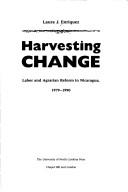| Listing 1 - 4 of 4 |
Sort by
|
Book
ISBN: 0813021499 9780813021492 Year: 1997 Publisher: Gainesville University Press of Florida
Abstract | Keywords | Export | Availability | Bookmark
 Loading...
Loading...Choose an application
- Reference Manager
- EndNote
- RefWorks (Direct export to RefWorks)
"Close study of the changing political responses of two peasant populations whose neighboring regions near the Pacific coast experienced different impacts from the Sandinista agrarian reforms. Shows the irony of some reform-beneficiaries turning against their benefactor-regime, a more likely event when productive relations become privatized. Argues, contra Huntington, that demobilization of various social groups will work against the achievement of development goals"--Handbook of Latin American Studies, v. 57.
Land reform --- Peasants --- Real Estate, Housing & Land Use --- Business & Economics --- Peasantry --- Agricultural laborers --- Rural population --- Marks (Medieval land tenure) --- Villeinage --- Agrarian reform --- Economic policy --- Land use, Rural --- Social policy --- Agriculture and state --- Political aspects --- Political activity. --- Political activity --- Frente Sandinista de Liberación Nacional. --- FSLN --- F.S.L.N. --- Sandinist National Liberation Front --- Sandinista National Liberation Front --- Nicaragua --- Politics and government

ISBN: 0807843156 0807819573 0807861278 9780807861271 9780807837993 0807837997 9798890865250 Year: 1991 Publisher: Chapel Hill ; London : The University of North Carolina Press,
Abstract | Keywords | Export | Availability | Bookmark
 Loading...
Loading...Choose an application
- Reference Manager
- EndNote
- RefWorks (Direct export to RefWorks)
One of the principal aims of the Sandinista government in Nicaragua was to end the exploitation of the rural poor. But its attempts to promote balanced economic development and redistribute agricultural resources created labor shortages that threatened the country's economic lifeline. New employment opportunities created through agrarian reform upset the delicate balance developed in pre-revolution years to meet the labor requirements of Nicaragua's two key crops, cotton and coffee. Laura Enriquez studied this problem extensively while working in Nicaragua between 1982 and 1989, and in Ha
Developing countries: agricultural and food problems --- Nicaragua --- Land reform --- Agricultural laborers --- Agriculture --- Agricultural workers --- Farm labor --- Farm laborers --- Farm workers --- Farmhands --- Farmworkers --- Employees --- Supply and demand --- Economic aspects
Book
ISBN: 150363129X 9781503631298 9781503613782 9781503631281 Year: 2022 Publisher: Stanford, California
Abstract | Keywords | Export | Availability | Bookmark
 Loading...
Loading...Choose an application
- Reference Manager
- EndNote
- RefWorks (Direct export to RefWorks)
Tracing the lives of four women as they came of age in revolutionary-era Nicaragua and later immigrated to Italy, this book examines social agency and its limits in the context of present-day Latin America and Europe.
Nicaraguans --- Women immigrants --- Women --- Social conditions. --- Nicaragua --- Italy --- Emigration and immigration --- Social aspects. --- Four Women’s Lives. --- Immigration. --- Italy. --- Nicaragua. --- Oral History. --- Revolution. --- Social Mobility. --- Structural Violence. --- Structured Agency.
Book
ISBN: 0271051019 0271036192 Year: 2010 Publisher: University Park, Pennsylvania : Pennsylvania State University Press,
Abstract | Keywords | Export | Availability | Bookmark
 Loading...
Loading...Choose an application
- Reference Manager
- EndNote
- RefWorks (Direct export to RefWorks)
"Analyzes the reaction of existing and former socialist countries to neoliberalism. Examines economic transitions in agriculture and the reconfiguration of socialism in Russia, China, Nicaragua, and Cuba"--Provided by publisher.
Farms, Small --- Land reform --- Former communist countries --- Economic policy.
| Listing 1 - 4 of 4 |
Sort by
|

 Search
Search Feedback
Feedback About UniCat
About UniCat  Help
Help News
News